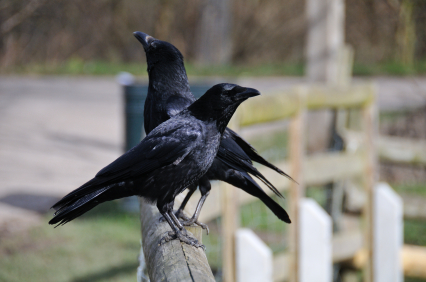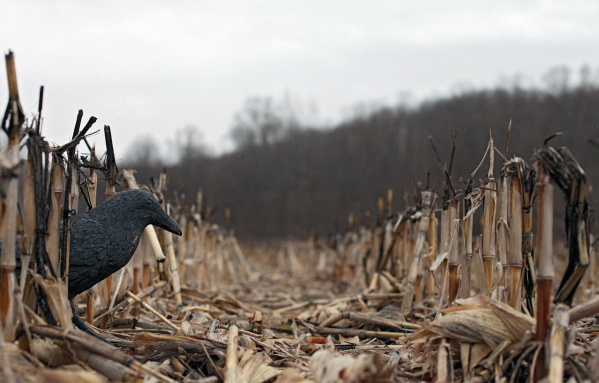A Raven is like a big crow with a deeper voice.
A REMARKABLE CROW.
WHILE at Coopersville, in Ottawa Co., Mich., I met with the great surprise of hearing a crow talk.
The bird is a handsome, large, two-year-old crow of more than usual intelligence for such a creature.
He will imitate the cackling of the hen as well as various other noises, so naturally as to deceive even the most critical ear. But his imitative freaks are not confined to the sounds of the lower animals, but as skillfully as a parrot he will repeat certain phrases which are current among men.
He seems to help himself in his articulation by partially spreading his wings and making a motion somewhat as he would if he started to fly, when he will shout lustily, "Boys! Boys! Boys! "—three or four times in rapid succession. Then he will, in the same way, with somewhat irritated tone of
voice shout, "Dry up! Dry up! Dry up!"
The most perfect imitation of the human voice from all I heard him say was the following call, which he uttered in a rather subdued tone: "Come watch! Come watch! Come watch!"
The bird has his favorites. Only these are allowed to stroke his bill by way of caress, and for these alone he seems inclined to talk. His chief favorite is the bright five-year-old boy of the owner, for whom he will repeat, by the hour, any one of the phrases he has learned which the little fellow may choose to call to him.
One day a crow from the woods alighted on the barn where this, his apparently much better endowed fellow-crow, was just then sunning himself (having been allowed to leave his cage); the stranger crow walked up to him, probably with the intention of addressing him in the common crow-dialect, and may actually have made his opening remarks, when a peremptory, dry up! Dry up! Dry up!" not only nonplussed the unsophisticated rustic, but put him to rapid flight.
Some years ago I had heard that crows could be taught to say certain words by having an incision made into their tongue. I was therefore curious to know whether some ingenious operation on the tongue of this remarkable creature had made him what he was. But upon inquiry I learned that nothing of the kind had been done to the bird, but that he picked up what he had learned of his own accord while kept in a cage.
I tell this story because I thought some of the younger readers would be interested to hear what a crow can do. If you would like to know how highly the owner values the bird, I can tell you what he told me, that he would not sell him for fifty dollars.
A. Kunz

THE SCARECROW.
THOSE are the robbers! " grandpa said
To neighbor's boy, Gold-locks, and Ted,
Out on the doorstep. As he spoke,
Over toward a distant oak
He pointed, where in fluttering rows
Were perched the black and noisy crows
Brown, and smelling an earthy sweet,
The field spread out beneath the heat,
With faintest lines of green to show
Where the corn had just begun to grow;
Hither had come the thieves in flocks—
"Little black hens," said wise Gold-locks.
" What shall we do? " with aspect grim,
To the three small folks who watched with him,
Said grandpa—he whose gentle hand
Spared even the spoilers of his land,
And who always planted thoughtfully
With an eye to squirrel, bird, and bee:
His frown was only a thin disguise
To hide the gentleness of his eyes;
For the veriest worm before his tread
Could lift unhurt its humble head.
But Ted, half cheated by his tone,
Thought gravely something must be done.
" We'll build a scarecrow, Jack, hurrah!"
(Hark! distant answer—"
Caw, caw, caw! ")
And, glad of a novel work to do,
Up to the attic stores they flew;
Sought for the worst of everything;
Then off to the field went scampering.
There, soon, a figure gaunt uprose,
With grandpa's long-discarded clothes
Hung from its limbs, no fit at all,
Too large in parts, in parts too small,
His hat upon its bristling hair,
Waving a threatening arm in air.
What did the sentry on the bough
Say to his pilfering comrades now?
Why, when the direful thing he saw,
He croaked serenely,
"Caw, ca-aw, ca-a-w!"
And still along the corn's green track
Stalked the thieves in glistening black.
Never a stately step showed fright,
Never a wing took hurried flight;
But still the flocks came, day by day,
To find where the yellow kernels lay.
No whit did the saucy creatures care
For the broom the scarecrow waved in air.
Gold-locks puzzled her little mind,
The secret of their ways to find;
She pondered; counseled much with Ted,
And, at last—a bright discovery—said:
"I know: if we wanted to scare the crows,
We shouldn't have put on grandpa's clothes! "
—Wide Awake.
